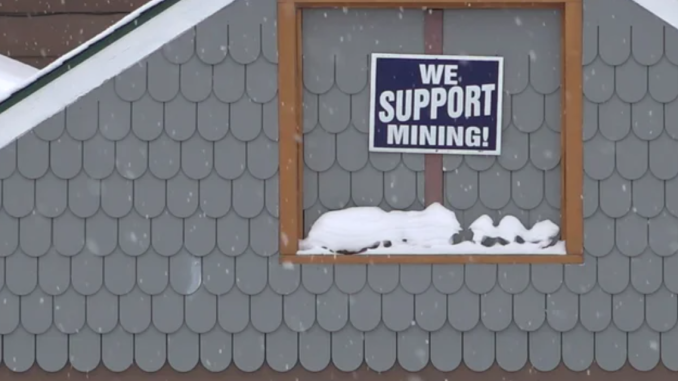
MINNEAPOLIS – The push to develop a cheaper way to manufacture phone batteries and car parts in the U.S. has hit a roadblock.
The U.S. gets over half the minerals it uses to make home building supplies and electric cars from other countries. The company Twin Metals was trying to change that by opening an underground mine in northeast Minnesota.
But a fight over the project’s potential environmental damage has had it hung up for years.
Twin Metals says its underground copper, nickel, cobalt and platinum metals mine would be located about nine miles southeast of Ely and 11 miles northeast of Babbitt.
The City of Ely is covered in snow now. By summer, thousands will flock there to enjoy the nearby Superior National Forest. Tourism is a big part of the town’s economy.
But Paul Bonde says the town’s in trouble.
“I have seen how the economy has changed in Ely in 50 years. When we moved up here there were five grocery stores, [now] there’s one,” Bonde said. “People are struggling in town.”
Bonde says he’s seen the town decline in population from 5,000 when he moved there to around 3,500.
“Certainly it would be positive from an economic standpoint,” Bonde said of the mining project. He’s concerned about the environmental impact of the mine, since he has seen firsthand the negative impact of mining on the iron range in the past.
Over the past decade, presidential administrations have gone back and forth on whether to allow Twin Metals to begin mining.
Ellie Piragis’ family has owned Piragis Northwoods Company, a wilderness outfitter, for over 40 years. It sells canoes, tents and other outdoor adventure essentials. She says when the Biden administration canceled Twin Metals mineral leases, it was a win for the Boundary Waters Canoe Area Wilderness.
“I think it’s been a tough time for the town. It’s definitely been divisive,” Piragis said. “As a business, we rely on the Boundary Waters, and we rely on it being exactly the way it is, which is pure and not polluted.”
But Ryan Sistad with Better in Our Backyard says the mine would help the environment because some of the minerals Americans use actually come from countries like China, Canada and Mexico. Better In Our Backyard advocates for responsible industrial development projects and companies in Northern Minnesota and regions surrounding the Upper Midwest.
“It’s not necessarily a win for the environment when it means we’re just going to continue to offshore argument other countries that don’t have the same environmental standards as we do,” Sistad said.
The demand for the minerals remains. The World Bank estimates that the production of battery minerals, including graphite, nickel and cobalt, could increase by 500% by 2050. This demand comes as industries are increasing their green technology efforts to counter the negative effects of climate change.
The mayor of Ely argues that American companies know how to mine responsibly now with less of an environmental impact.
“You can fight, you can feel like, ‘Rah-rah, I’m going to save the earth,’ and it’s never going to happen. It’s gonna happen,” Roger Skraba said, suggesting mining will ultimately be allowed.
“At some point we all have to pick and choose how much risk we’re willing to take in life and go forward.”
Twin Metals said it would provide 750 permanent jobs and nearly 1,500 spin-off jobs that would help support the growing population the project would attract. Twin Metals says it will fight efforts to stop the project.
“We will challenge this attempt to stop our project and defend our valid existing mineral rights. We expect to prevail,” the company said in a statement to Fox News. “This is not about law; this is a political action intended to stop the Twin Metals project without conducting the environmental review prescribed in law.
“We have proposed a world-class underground copper, nickel, cobalt and platinum group metals mine that deserves to be evaluated through the established environmental review process. Our proposal, submitted more than two years ago to state and federal agencies, was the culmination of more than a decade of engineering, hydrogeological, environmental and engagement work that maximizes environmental protection.
“We are confident that a full environmental review will show that the science behind this modern mine will prove that we can advance this project safely under the highest of standards.”
The mining leases were first issued in 1966 and rescinded by the Obama administration in 2016. The Trump administration then reinstated the leases in 2017 and renewed them in 2018 and 2019. The Department of Interior wrote in January that the Trump administration violated Bureau of Land Management regulations and did not prepare an adequate analysis of the renewal.
The Minnesota Department of Natural Resources has stopped working on the state’s environmental review of Twin Metals proposal from 2019.
*story by Fox Business


